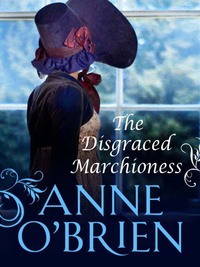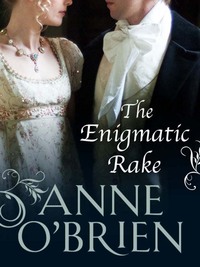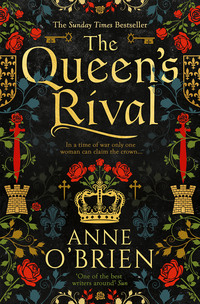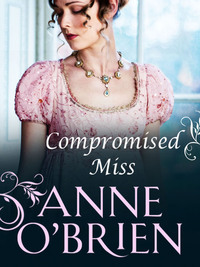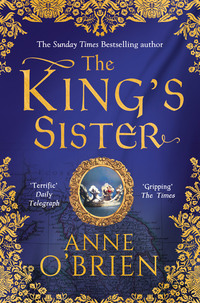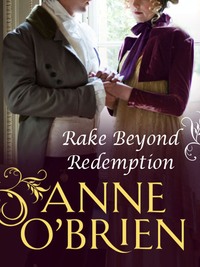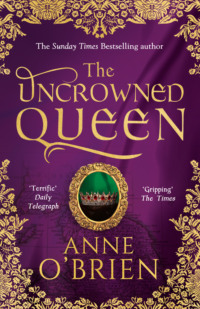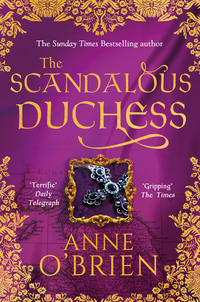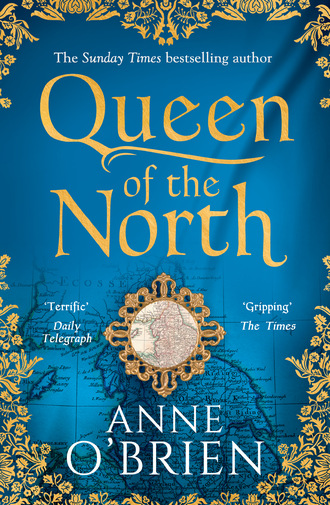
Полная версия
Queen of the North
What would I do if he was dead? My mind could not encompass it.
Broken hearts suddenly became a real fear. But for whom? All I knew in my own heart was that the resolution of these events would never be to Isabelle’s contentment.
I waited, carved emblems of royal power pressing down upon me in case I should forget who was King of England. Would he be in shackles? I thought it not appropriate that he should be.
Even at this moment of high anxiety, the Great Hall at Westminster, newly furnished and embellished, heralded the power of King Richard the Second. His personal emblem, the white hart, collared in gold, was repeated again and again, with a throng of heavenly angels carved at the end of each beam in the great hammer-beam roof. Each angel carried a shield, the majesty of the fleur-de-lys of France quartered with the three leopards of England. Richard’s heraldic symbol. This was Richard’s hall, built by him, with a new throne that he had had carved, complete with a gilded cushion, positioned on the dais for all to see.
I was here because I had been told that Richard was coming. I was here because I thought it my duty to be here to witness the return of my cousin.
Without warning the great doors were dragged back; in marched an armed guard, and there at the centre of their protection, or perhaps their containment, walked King Richard.
The guard came to a halt and so did the King.
I could not take my eyes from his face.
Never had I seen Richard so unkingly, whether in demeanour or in apparel. Pale, dishevelled, his soft lips pressed hard together, he stared around him as if he had still to accept where he was and why he was here, hemmed in by soldiers not in his livery. Without thought, so it seemed to me, he was plucking at the hem of his tunic, a garment that he might have been wearing for the whole of the journey from Wales, so travel-worn and stained as it was. His boots were covered in dust, and his hose to the knee. His eyes looked wild and uncomprehending as if he had been pushed beyond his bearing. Strained, even hollow-cheeked, he might not have eaten a good meal since he had fallen into Lancaster’s hands.
At last Richard’s vacant gaze fell on me, so that I stepped forward, and from a lifetime of custom and loyalty I curtsied. The King made no sign of recognition. At close quarters, his eyes were glassy as if unknowing of what was expected of him. Perhaps that was the problem, I thought, watching the febrile glance he cast this way and that. For the first time in his adult life nothing was expected of him. He was not in control of who must do what at his royal command. And I realised the enormity of what had happened. What Lancaster had done. What we had done. Whatever my ambitions for my Mortimer family, Richard was the true heir. No one could promote a legitimate case for his not wearing the crown. His blood was true in descent from King Edward the Third, eldest son to eldest son. Yet what hope was there for him now?
Compassion touched my mind, as it had for Isabelle.
As he was led away, his shoulders bowed, I knew that Richard would never again take his seat on the throne beneath the angelic throng.
Fleetingly, I wondered if Isabelle would be allowed to see him.
More critically, as I watched Richard being escorted to some place of confinement, I wondered if Lancaster was still intent on keeping his oath, that he would not disturb the true inheritance. A warm fear rose to fill every space in my mind, in my heart. What we had done, whatever it might be, was irrevocable. I could not yet see with any clarity the road that I would be forced to tread. And beneath the fear, struggling to be born, was just the faintest breath of guilt.
Chapter Five

Westminster: 13 October 1399
Cold and cramped, I stood in my chamber in the rambling palace of Westminster, clad in robes that were not of my choosing although the fit was remarkably good, aided with a pin and a stitch here and there. Opposite me stood Harry, even more resplendent, hands fisted on his hips. Harry looked uneasy as if he would rather be in hunting leathers or readied for some Scottish skirmish, but there was a determination in the rigidity of his jaw as he carried the finery of a full-skirted, ankle-length houppelande well, with its dagged sleeves and ermine edges. The draped folds of the chaperon, set squarely on his head as if some furred animal, all fringed with gold, was of a similar hue. Unfortunately Henry of Lancaster had not considered Harry’s red hair in the choice of garments.
‘Well?’ he asked, under my critical gaze.
I was in no mood for doling out admiration.
‘I am not in agreement with this,’ I announced.
‘As you have made more than clear for the past se’nnight. But you will do it because I ask it of you,’ was all the reply I got.
‘Or because you order me to do it and I will concur, as a good wife should obey her husband.’
‘If you wish. This is not the time for soul-searching, Elizabeth. We are here. We have walked at Lancaster’s side every day, acknowledging all he has done. This is the culmination of all the weeks since we met with him at Doncaster.’
‘Weeks in which the Earl your father broke as many oaths as did Lancaster. When Lancaster swore to bow before those with a superior claim to the throne.’ I gave Harry no quarter. ‘Of which there are two. Our erstwhile King Richard, now a prisoner, and then Edmund Mortimer, Earl of March. What happened to all the fine words at Doncaster? Trampled, it seems to me, under the joint mail-shod feet of Lancaster and Northumberland.’
These were weeks in which the Earl of Northumberland had played a significant, some would say an inglorious, role to ensure Lancaster’s ultimate victory, plotting with habitual cunning to take control of Richard who had sought refuge in Conwy Castle on his return from Ireland. The Earl swore that Lancaster did not desire the throne, swore his own firm allegiance to King Richard, before taking him into custody and dropping him into the waiting hands of Lancaster at Flint Castle. Richard’s friends and erstwhile counsellors had promptly made themselves scarce or sided with the Earl of Northumberland who promised them safe passage in his retinue.
‘Lancaster did not get where he is today merely by force of arms.’ Harry was glaring at my intransigence. He was in no mood to admire my own appearance either. The deep red of velvet and damask complemented my own dark colouring.
‘No. He was led to the throne by self-serving magnates like the Duke of York, who conveniently changed sides when Richard capitulated to your father at Conwy and they saw which way the wind was blowing. But Percy arms played the major part in this travesty. Lancaster is not the heir. This is wrong, Harry!’
‘Wrong it may be, but this is what will happen.’
‘And your voice will not be raised against it?’
He stalked to where a flagon of ale and cups had been left for us, poured, emptied one in a gulp and gave another to me as he replaced his on the board with a smart thump.
‘Of what value would that be, to raise one voice in the midst of thousands? Lancaster has been acclaimed by the rabble in the streets and by the lords and clerics at Westminster. One voice will not be heard amongst the rest.’ He scowled down at his feet clad in softest unscuffed leather. ‘Nor am I sure that I wish it to be.’ He looked up at me under his brows. ‘There is so much validity in Lancaster’s claim. The Earl of March is too young, too untried, and the female line of his royal descent disliked by so many. The old King, your great-grandfather, saw the weakness of it when he issued a decree that after his death only males would inherit. Which neatly obliterated your mother’s claim in spite of her Plantagenet blood. Yes, I know what you will say…’ when I opened my mouth to argue, ‘but it’s a matter of right of inheritance against the demands of political expediency. I’ve thought much of this and…’
‘You have changed your mind, haven’t you? You will give your wholehearted allegiance to this man who fooled us with his mummer’s oath-taking.’
I was baffled, horrified, that he had done so after our hearts and minds had seemed so closely in tune. Here was my husband, comfortably in political alliance with Henry of Lancaster. Disappointment was sour in my belly, churning with the acknowledgement that it would be beyond my powers to change Hotspur’s mind, once it was fixed on the vision before him, whether it be the enemy across the battlefield or the usurper who already had the crown in his hand.
‘Yes, for the most obvious of reasons. Young Edmund should be King, I’ll not deny it, but it may be that our own power in the north will be more secure with a friendly Lancaster than a young boy who cannot hold the reins of power.’
‘Unless Lancaster becomes unfriendly and decides to strip it from you!’
‘He owes us too much to do that. There is no real support for Mortimer, and as you see, it is overwhelming for Lancaster. So I think in the circumstances to support the Earl of March would not be politic.’
‘Does that make his claim an empty one?’ I would propound every argument at my disposal to change his mind, quick anger surprising me, glossing my words with fiery eloquence. ‘You know that it does not. It is no empty claim. Richard was crowned King as a child, little older than Edmund Mortimer. With a strong council England suffered no hardship. A child King did not cast England into revolt or attack from abroad. My nephew is the legitimate heir, and if the crown does not sit legitimately, what stability will it give this kingdom? The power will be on offer to every magnate who has ambition to seize it for himself. It should undeniably be Mortimer, not Lancaster.’
‘I accept all that you say, but you can’t argue legitimacy, Elizabeth. We unseated Richard fast enough when it suited us.’
‘That was not Lancaster’s sworn intention when he made that thrice-damned oath. We were all fooled. But if Richard is not King, it should be Edmund Mortimer by the right of his mother’s blood and his father being King Edward’s second son. You know that is the truth of it, but have clearly rejected it for the sake of your own power. Because it is politic.’ I drew breath. ‘And when were you going to tell me?’ My anger was now hot beneath my sleek fur. ‘I doubt your father gives any credence to the Mortimer claim either.’
‘I doubt it too.’ Harry found the need for another cup of ale. ‘Whatever the rights and wrongs of it, here we are, trussed up like Christmas geese, and today Henry of Lancaster will be crowned King. Are you ready?’
I spread my arms. ‘Do I look ready? Lancaster has paid for the clothes on my back!’
‘You look magnificent.’
‘So do you look magnificent, but to what purpose?’ Even in my anger, he was beautiful. ‘There’s no need to be concerned. I will do you proud.’ My jaw was as tense as his.
‘Are you going to drink that?’ I still held the untouched cup in one hand. ‘I suggest you do. It will give you a mellow edge. And try to be polite. At least there will be no possibility of your conversing with your regal cousin until after the event, when he will be your King. It might put a curb on your tongue.’
I bared my teeth, and drank. For Harry’s sake, and because I foresaw no good in creating dissention at this late point in the proceedings. I resolved, for this day at least, to be the perfect subject.
‘I will curb my tongue today. But don’t hazard your Percy acres on my being mellow tomorrow.’
Despite the desultory rain, the coronation of Henry, Duke of Lancaster, was an affair to be remembered in later years, when men gathered in alehouses or in their lordly castles, reminiscing over small beer and Bordeaux wine. As Harry had announced, my cousin Henry had been acclaimed King by the lords and commons, led to the vacant throne in Westminster Hall by his royal uncle the Duke of York and the Archbishop of York, thus awarding him the highest of commendations from church and state. This sacred crowning was merely the culmination in Westminster Abbey, ratifying the choice of the people of England in the sight of God. He had not taken the crown by force, although the rightness of Richard’s imprisonment and the purloining of his crown was open to question. Lancaster had been invited to be King. Both Harry and the Earl had joined the lords to acclaim Lancaster King of England.
I considered him an oath-breaker.
Now, bareheaded but clad in cloth of gold, with nine water fountains teeming with red wine to win over the populace in Cheapside, Lancaster became King Henry the Fourth of that name.
Anger seethed afresh, despite my promise to guard my demeanour, as the ceremony unfolded. I nudged Harry, angling my chin toward the procession where the great swords of state were being carried in before the usurper monarch. Four of them rather than the traditional three. The two swords of justice bound in red and gold were carried by the Earls of Somerset and Warwick. Curtana, the blunt sword of mercy, was held aloft by Lancaster’s eldest son who would now be designated Prince Henry. And processing before them all?
‘Did you know about this?’ I asked.
There leading the procession was the mighty Earl of Northumberland, swathed in red and ermine, carrying the great Lancaster Sword. A true sign of Northumberland’s dedication. There was no element of age in his rigid spine, his braced shoulders as he bore the weight along the length of the nave up to the high altar. The pride in his face was as great as that of the new King himself.
‘Did you know?’ I repeated, when Harry merely watched his father’s stately progress. I thought I read pride in him too.
‘Yes.’
‘So you are truly tied and bound to this King.’
‘Tied and bound with iron chains,’ Harry hissed. ‘And before you meet with him again, my father has been given the highest accolade. He is now Constable of England for his services to the King.’
‘Before God, he is not!’
So there was the reason for the Percy acknowledgement of this destruction of the true pattern of inheritance. The all-devious Earl of Northumberland now lay claim to being the chief official in the royal household, a position of much power and influence in deciding who should and should not have the ear of the King. It was a magnificent coup.
‘Before God, he is. You can see the Earl’s chain of office. It shines like a beacon on the northern hills.’ I thought Harry sounded cynical, but his expression was bland enough. ‘Perhaps this is not the occasion to use immoderate language, Elizabeth.’
I closed my mouth.
And so it was done, with consecrated oil, hallowed phrases and the holy objects of kingship. Lancaster was duly crowned King of England.
‘Now all we have to do is smile, bow, and celebrate at the feast,’ I said.
There was nothing else we could do, but it gnawed at me, tainted my acceptance of a life that pleased me mightily; a grub in the succulent flesh of a plum. Harry had been in agreement with me, I had thought, but how quickly he had abandoned this brave stance. Now he was all for Lancaster. As for the Earl of Northumberland, he had sold his soul for the office and chain of Constable of England. I was furious with them both. Nor was it a problem that I could imagine would disappear. Lancaster was King and we were his subjects and most valuable of counsellors.
I did not feel like celebrating.
Yet all was not lost in a seething cloud of disapproval, for here was the opportunity for family reunion; three sisters, meeting between the weight and solemnity of the crowning and the raucous feasting and drinking of the festivity to follow. Philippa, Alianore and myself.
‘We look like three cunning women,’ Philippa observed as we withdrew into a sisterly group, into a corner where we would not be buffeted by the milling lords, citizens and their hangers-on. ‘Plotting our future.’
‘Perhaps we are,’ I said, kissing her cheek.
‘We may have need to be,’ Alianore offered, beaming at us both, but behind the smile I saw raw concern. ‘Good to see that you stand high in Lancaster’s regard, Elizabeth. Red becomes you more than it does Harry.’ She fingered the opulent, gold-worked over-sleeve of my houppelande with what could have been distaste, before submitting to a sisterly hug. ‘Even Harry looks presentable. For once he doesn’t look as if he has just ridden in after a month of besieging a Scottish peel tower.’
‘You are hardly clad as a beggar, Alianore. But we Percys are royally grand, are we not, down to the collar and coronet?’ I touched my fingers to the intricate chain around my neck. ‘And why not? We have been bought,’ spreading my arms to set the damask with its sable trim rippling as if a living thing. ‘A crown in return for a damask robe. Have you seen my gilded shoes?’ I lifted my skirts a fraction. ‘These were in payment for Northumberland carrying the Lancaster sword. Which is the greatest symbol of power, do you suppose? Gilded shoes or an edged weapon? Richard would have said shoes,’ I added, admitting to a touch of guilt at his present incarceration in the Tower, recalling his love of extravagant footwear.
‘Richard has forfeited his throne, shoes or no shoes.’ Philippa’s voice had a tendency to carry, until I nudged her. ‘I’d wager on the power of the sword.’
‘Best not to say that too loud, on this fine auspicious occasion,’ I suggested, seeing heads turned in our direction.
‘What will happen to Richard?’ Philippa asked, dutifully lowering her voice. ‘Can our new King afford to let him live?’
My sister did not seem overly concerned. We were all well versed in political necessity. How would we not be, brought up as we had been at the centre of political events? The first Mortimer Earl of March had met his death by execution after a remarkable history of treason, hand in glove with the Queen against the rightful King Edward the Second.
‘I’ll not be sorry if he dies a quiet death.’ Philippa paused. ‘Or even a violent one. I’ll never forgive him for taking Arundel’s head. It was disgraceful that Richard should be free to take such monstrous revenge.’
To bring a halt to this well-worn theme, I clasped her hand, thinking that she looked strained, more than was demanded by the weariness of the long ceremony. Perhaps it was true grief that ate at her stamina, despite the vast age difference between her and her late FitzAlan husband. ‘I know. I am sorry that the loss afflicts you.’
‘It was the manner of the loss,’ she said. ‘Richard does not deserve my pity.’
It had been a driving force within her, destroying any comfort that the passing of months and a new, kindly husband might have brought. Philippa had not had an easy life, considering the deaths of her two former husbands. An accidental lance to the groin for one, an axe to the neck for the other. It had destroyed any trace of the soft humour my sister had had when we were girls, nor had she a nursery full of children for her comfort.
‘Where are your sons, Alianore?’ I asked to deflect a further outburst of venom.
‘Safely in the Welsh March. I sent them to stay with your brother Edmund at Ludlow, although I think he’s taken them on to Wigmore. I’d not bring them here. I’ll never bring them here.’
It had not been the happiest of deflections. Alianore and I regarded each other with a depth of understanding.
‘We are committed to this new rule, Alianore,’ I said. ‘Our lords were all prominent during the bowing, oath-taking and anointing.’
‘Except brother Edmund who is not here.’ Alianore pointed out what we had all already acknowledged.
‘Edmund is a law unto himself, pleasing unto himself. It is no surprise.’ Philippa’s bitterness continued to pervade every word she uttered.
‘We are committed,’ I repeated. ‘We have to be so.’ Bitterly, disbelievingly, I realised that I was echoing Harry’s own words, when, less than an hour ago, I had been berating him for his betrayal. I felt no commitment.
‘But are we content? I will never be content.’ Philippa again.
‘Nor I.’ Alianore.
‘Lancaster promised to support the most suitable claimant,’ I said, studying the rings on my hands, trying for balance where there was no balance. I was as unsettled as my sisters.
‘Suitable? What does that mean?’ Alianore’s voice climbed. ‘What about God-given right? My son Edmund is suitable. He has the right.’
‘But Edmund is so young.’
‘He will grow. All he needs is a regent and a group of trusted counsellors. It has been done before, it could be done again. Richard had a council, and his lady mother, Princess Joan, until he reached his majority.’
I tried to be realistic, and loyal to Harry, when I had no wish to be so. My thoughts matched Alianore’s. Princess Joan, Alianore’s grandmother, had been a match for anyone in guiding a youthful King. But in my mind I heard Harry’s warning echo and re-echo.
‘No one will stand for a child, if Lancaster is here with an army and the support of the lords. No one would willingly choose a regency. Besides, it is done now. The lords have made their decision.’
‘Any man of principle would be quick to choose the rightful bloodline,’ Alianore said. ‘Decisions can be unmade. Kings can be un-kinged. Have we not just proved it? It is a dangerous precedent, but it can be used to our advantage.’
‘As Lancaster knows.’ Playing devil’s advocate was proving exhausting. ‘He will be on his guard against any threats to his new power.’
Another unfortunate gambit. Alianore leaned to whisper in my ear: ‘What do I do if he sends for the boys? They were royal wards under Richard. They will continue to be so. They are the only challenge to his power.’ Her whisper became a sibilant hiss. ‘What do I do if Lancaster sends for them? Can I refuse?’
‘Let them come,’ Philippa advised, our heads close. ‘I don’t believe Lancaster will do what is unjust. They will not meet a hasty death.’
‘Is there ice in your veins, Philippa?’ Alianore demanded.
‘No. I am merely practical. Besides, what can you do? Short of hiding them in the Welsh March or sending them into the fastness of Wales, you can do nothing but obey. I think that we should smile on our new King. Unlike Richard, he has no blood on his hands.’
‘Not yet. What do you say, Elizabeth?’
‘I say I don’t like the thought of them being here under Henry’s dominion but I agree with Philippa. I don’t see that you have a choice. Nor do I see King Henry being guilty of murder.’
Alianore proved intransigent. ‘I thought we had agreed that he might very well arrange for Richard’s demise in some distant castle. Why not my sons too? Then all opposition is destroyed, and King Henry can toast the untrammelled inheritance for his own four sons.’
‘I know.’ I sighed, acknowledging that I would not wish to send my own children into Lancaster’s keeping. Not that I feared him, but I would not wish them out of my sight. ‘There is no easy path, is there?’
Such disloyalty, such treachery, in such seemingly innocuous conversation when all around us were celebrating. The interruption, which effectively silenced us when it came, was smoothly inviting.
‘You look to be in serious confidences together, cousins. Does the new reign already see the stirring of a plot?’
We turned as one to regard the newcomer, recognising the voice, the light timbre, the teasing note.
Constance of York, daughter of the ineffectual and allegiance-swapping Duke of York and his Castilian wife. Now Lady Despenser, Countess of Gloucester, Constance was fair-haired and fair-skinned amongst the Mortimer sallow complexions and dark hair, a goldfinch in the midst of sparrows – although today her hair was invisible, neatly coifed in a jewelled net. She was quite beautiful, and artful in presenting her beauty; in comparison her tongue could be uncomfortably sharp. Sometimes cousinship presented us with a high price, but on this occasion she seemed to be all gentle compliance. It pleased me that Alianore, who had inherited much of her grandmother’s glorious golden beauty as the Fair Maid of Kent, was inclined to cast Constance into the shade.


